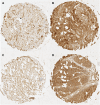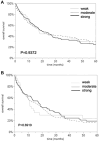CD147 expression lacks prognostic relevance in esophageal cancer
- PMID: 34997863
- PMCID: PMC8930885
- DOI: 10.1007/s00432-022-03917-2
CD147 expression lacks prognostic relevance in esophageal cancer
Abstract
Introduction: The role of CD147 as an important indicator of tumor prognosis remains controversially discussed in literature. We focused on the prognostic significance of CD147 expression in esophageal cancer patients. While some studies report that CD147 is an unfavorable prognostic factor in esophageal squamous cell carcinoma, others showed no significant correlation. However, only one study draws attention to the significance of CD147 in esophageal adenocarcinoma, which is one of the most rapidly increasing neoplasms in the western world.
Methods: To finally clarify the impact of CD147 as a prognostic factor, especially for esophageal adenocarcinomas, we analyzed CD147 expression in a tissue microarray of 359 esophageal adenocarcinomas and 254 esophageal squamous cell cancer specimens. For the immuno-histochemical analysis, we used a primary antibody specific for CD147. Staining intensity and proportion of positive tumor cells were scored (negative, weak, moderate, strong staining). These findings were compared to normal esophageal tissue and correlated to the histopathological tumor phenotype and survival data.
Results: CD147 expression was detectable in weak intensities in benign esophageal tissue (85.78%) and expressed in predominately moderate to strong intensities in esophageal cancer (88.34%). Strong CD147 immunostaining was linked to increased infiltration depth (p = 0.015) and differentiation (p = 0.016) in esophageal squamous cell cancer but revealed no significant correlation with histopathology of adenocarcinoma. Moreover, CD147 intensity was unrelated to overall survival in this collective for both subtypes of esophageal cancer.
Conclusion: Thus, our data show that CD147 has no prognostic value, neither in esophageal adenocarcinoma nor squamous cell carcinoma.
Keywords: CD147; Esophageal adenocarcinoma; Esophageal cancer; Esophageal squamous cell cancer; Immunohistochemistry; Tissue microarray.
© 2022. The Author(s).
Conflict of interest statement
The authors declare that they have no conflict of interest.
Figures


References
-
- Basset P, Bellocq JP, Wolf C, Stoll I, Hutin P, Limacher JM, Chambon P (1990) A novel metalloproteinase gene specifically expressed in stromal cells of breast carcinomas. Nature 348(6303):699–704. 10.1038/348699a0 - PubMed
-
- Biswas C, Zhang Y, De Castro R, Guo H, Nakamura T, Kataoka H, Nabeshima K (1995) The human tumor cell-derived collagenase stimulatory factor (renamed EMMPRIN) is a member of the immunoglobulin superfamily. Cancer Res 55(2):434–439 - PubMed
-
- Cheng MF, Tzao C, Tsai WC, Lee WH, Chen A, Chiang H, Jin JS (2006) Expression of EMMPRIN and matriptase in esophageal squamous cell carcinoma: correlation with clinicopathological parameters. Dis Esophagus 19(6):482–486. 10.1111/j.1442-2050.2006.00613.x - PubMed
-
- Ellis SM, Nabeshima K, Biswas C (1989) Monoclonal antibody preparation and purification of a tumor cell collagenase-stimulatory factor. Cancer Res 49(12):3385–3391 - PubMed
MeSH terms
Substances
LinkOut - more resources
Full Text Sources
Medical

